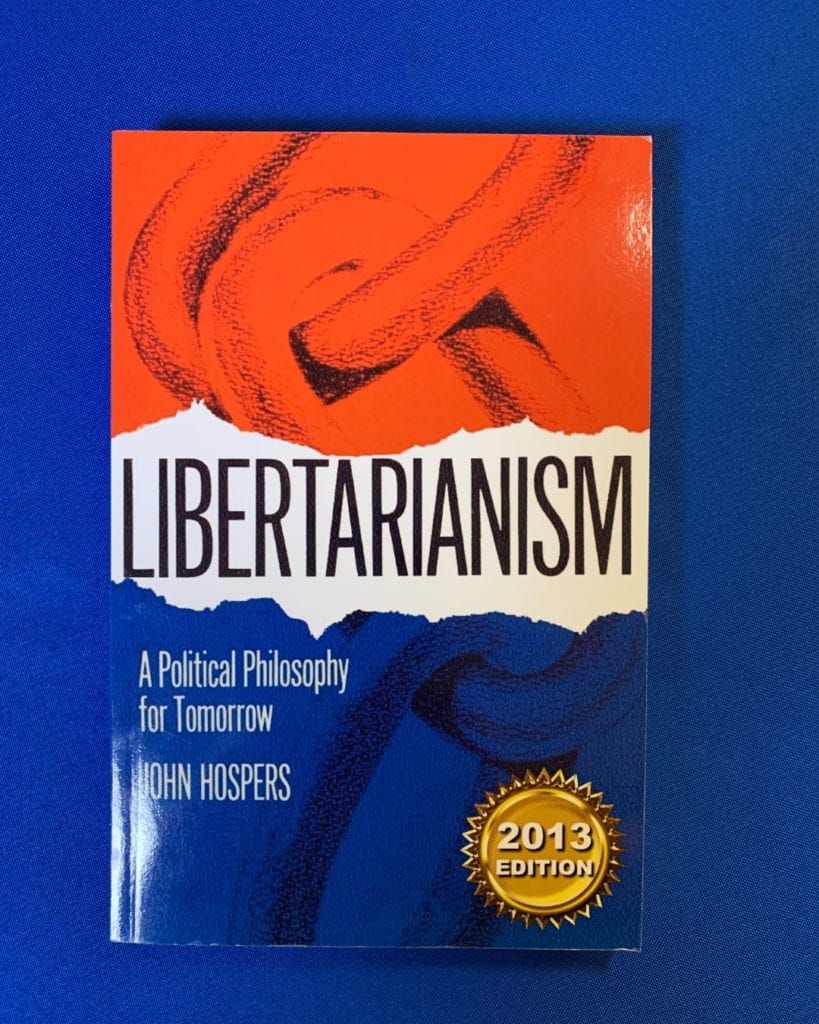Book Recommendation: Libertarianism - A Political Philosophy for Tomorrow by John Hospers
John Hospers was a professor of philosophy and the first Presidential candidate for the Libertarian Party in 1972. Via Wikipedia: "Hospers and Toni Nathan received one electoral vote from faithless elector Roger MacBride, a Republican from Virginia, resulting in Nathan's becoming the first woman and the first Jew to receive an electoral vote in a United States presidential election."
Click here for past recommendations.
Description
The Original Book that Inspired the Worldwide Political Movement
John Hospers on What Libertarianism Is:
1) No one is anyone else's master, and no one is anyone else's slave.
2) Other people's lives are not yours to dispose of.
3) No human being should be a non-voluntary mortgage on the life of another.
Dr. Hospers sees these as three versions of the same absolute right of personal liberty. In other words, assuming we are talking about mentally-able individuals, no person can make their life better by reducing the liberty of another person.
For the same reason that slavery is wrong, it is equally wrong to involuntarily deprive others of their time or money. The basic human rights of life and liberty cannot exist without a right to property. The benefits I create for myself are MINE, and to take them away (or to make me work for another's benefit without my consent) is wrong.
RIGHTS are ONLY to be understood as involving duties of forbearance or restraint. In other words, so-and-so's right to property is nothing more than the duty that others have to refrain from taking that property for themselves.
Rights belong naturally to us. Rights are not something given to us by governments. Rights are claims that we make AGAINST governments! If I have a right to benefit from my own labor, then the government is wrong to take any of those benefits from me without my consent.
"The only proper role of government ... is that of the protector of the citizen against aggression by other individuals."
•Because governments has the role of "protector," government must possess enough force/power to protect its citizens (e.g., by having a police force and/or military and a related system for punishing or neutralizing those who practice aggression against others).
•Aggression against others includes unintended harms to others. Government also has a role in deciding and settling claims of harm by others.
•Other than providing for these legitimate functions, government has no right to tax its citizens for any purpose whatsoever.
•Government should intervene only in a RETALIATORY situation. The government must never INITIATE an action to create a better world -- it is not the business of government to make an advance decision about what counts as benefit. Through laws, government can prohibit various aggressive actions, but it cannot require the bringing about of supposedly beneficial ones.
Government charity, social programs, public works, etc., require one person to pay for the benefits that another person will receive. However, doing this through involuntary taxation is theft of property.
LIBERTARIANISM by John Hospers
The POLITICAL PHILOSOPHY WHOSE TIME HAS COME
"For many decades, news reports on the intellectual activities of the younger generation have been confined almost exclusively to advocates of statism and collectivism. Only recently have there appeared the first acknowledgements, in the newspapers, of a rising interest among the younger generation in political philosophy that stands in radical contrast to this authoritarian trend: Libertarianism.
"Now, Professor John Hospers, Director of the School of Philosophy of the University of Southern California, has given us, in his latest book, a clear statement of the central political-economic positions of this young intellectual movement. The book is offered, not as an original work of philosophy, but rather as an attempt to delineate the major positions on which most Libertarians would agree -- and to answer many of the objections and questions with which Libertarians have to contend.
"Libertarianism is very simply and clearly written and requires no technical knowledge on the part of the reader. Enjoyable, informative reading."
- Nathaniel Branden, Author of THE PSYCHOLOGY OF SELF-ESTEEM


